Welcome to Matrix Education
To ensure we are showing you the most relevant content, please select your location below.
Select a year to see courses
Learn online or on-campus during the term or school holidays
Learn online or on-campus during the term or school holidays
Learn online or on-campus during the term or school holidays
Learn online or on-campus during the term or school holidays
Learn online or on-campus during the term or school holidays
Learn online or on-campus during the term or school holidays
Learn online or on-campus during the term or school holidays
Get HSC Trial exam ready in just a week
Get HSC exam ready in just a week
Select a year to see available courses
Science guides to help you get ahead
Science guides to help you get ahead
In this article, we share tips from the Matrix Maths team that will help you ace your HSC Exams.

Join 75,893 students who already have a head start.
"*" indicates required fields
Related courses

Join 8000+ students each term who already have a head start on their school academic journey.
The HSC Exams are coming fast. they are your last chance to save your marks and cement your rankings… but don’t fear! You still have a chance to make a significant impact on your marks. that’s why we’ve compiled these 7 HSC Exam study habits Band 6 Maths students do that others don’t.
A step-by-step planner to maximise you time for study and play! Fill out your details below to get this resource emailed to you. "*" indicates required fields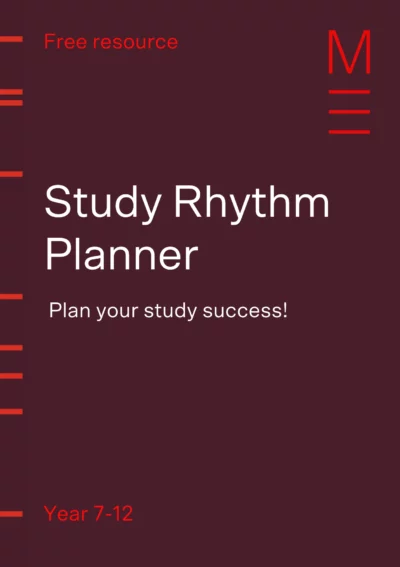
Get your free Study Rhythm Planner

Get your free Study Rhythm Planner
The first thing that Band 6 Maths students do, is that they create a practical and effective study plan by figuring the following:
Study plans are important because they help you organise and balance your studies for your different subjects and topics.
It is crucial that you are creating a study plan that is practical and achievable because you don’t want to lose motivation when you begin to fall behind on your schedule.
So, here some things you need to consider before you start planning your study timetable:
Band 6 students always set themselves goals because it gives them a sense of direction.
Imagine running mindlessly without a destination in mind… you will get nowhere productive.
So, it’s important to set your Maths HSC exam goals, whether this is to improve your Maths marks, to achieve a certain rank, or to boost your ranking.
Knowing your weaknesses and strengths will allow you to better prioritise your studies.
What Band 6 Maths students do is that they allocate specific time periods to focus on their weaknesses, whilst still revising the other topics.
This means that they can improve on their weaknesses, whilst still maintaining their confidence in their strengths.
So, this is how you can figure out your strengths and weaknesses:
Then, you should use a Priority Matrix to decide what’s urgent and what’s important to schedule your days:
Being realistic about how much time you have to study, take breaks, and do personal activities is very important.
Remember, you should spend some time on all of your Maths topics, not just your weak ones.
This will ensure you don’t forget what you learned 3 terms ago… which can happen even if you did really well for that topic!
So, break down your studies into smaller chunks and be practical about the time allocation.
If you find that you are struggling to plan effectively or make time to study each Maths topic, then you can also join our HSC Exam Prep Course. This course will help you revise all the Maths topics and provide you with plenty of practice questions.
If you want to learn more about creating an effective study plan, take a read of our article: How to Create a Study Plan that Works.
Band 6 Maths students understand the importance of being familiar with the Maths syllabus, reference sheet, and exam structure.
Let’s see how and why!
The syllabus is one of the most important tools to studying and preparing for your Maths HSC Exams.
This is because it clearly identifies which topics, sub-topics, content and formulas that you will be assessed in your HSC Exams.
With it, you will be able to easily identify your missing gaps of knowledge and your strengths to prepare your study schedules.
Take a look for yourself:
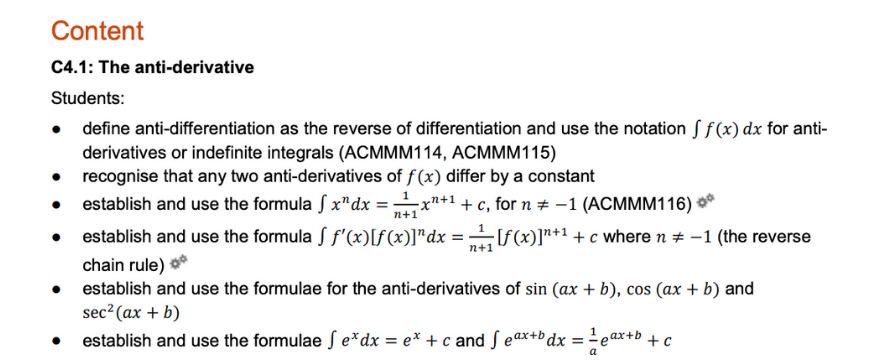
The sub-topic is ‘anti-derivative’, and the dot points include the content and formula you must know to ace your HSC Maths exams.
So, to take advantage of your syllabus, you should follow these steps:
After doing this, you will be able to identify your strengths and weaknesses to figure out the topics you need to focus on more.
You can find the syllabus here:
For Maths Adv, Ext 1 and Ext 2, students are given a reference sheet to use during the exams. Here is a link to the exact formula sheet that you will be given in your HSC exams: NESA’s Maths reference sheet.
Band 6 Maths students always take advantage of this reference sheet and use it during the exam.
They’re not wasting brainpower attempting to memorise these formulas, and they know where everything is placed on the sheet so they’re not wasting precious HSC exam time flipping through the pages of the reference sheet.
So, this is what you need to do to:
However, remember the reference sheets only includes some important formulas, not all of them. So, you still need to write your exam notes and memorise the other formulas.
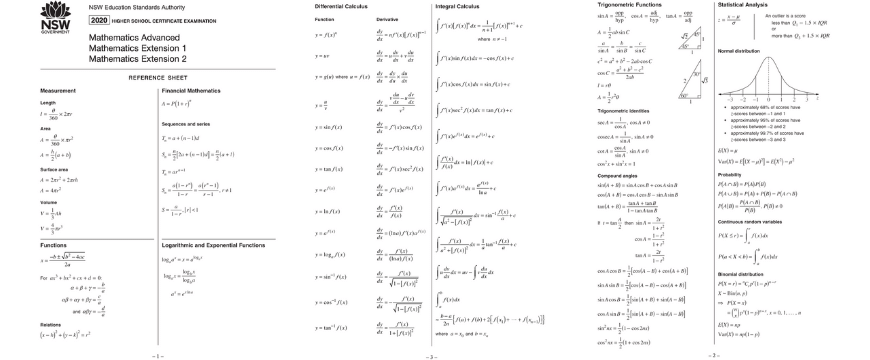
If you need help remembering which formulae are which, read our guide.
Start HSC Maths confidently
Expert teachers, weekly quizzes, one-to-one help! Ace your next assessment with Matrix+ Online.
Remember, your HSC Maths exams will also assess you on your Year 11 content.
Year 11 Maths is considered as ‘assumed knowledge’ in your HSC exams.
Top Maths students achieve Band 6’s because they are confident with their preliminary content, as well as mastering new HSC content.
So, it is crucial that you allocate some time to revise your Year 11 content and ensure you understand everything.
To do this, aim to:
By now, you should have detailed Maths notes (whether this is from your classwork or Matrix workbooks), and a formula book.
Band 6 students will use both types of notes to prepare for their HSC exams because they recognise the benefits of both.
Let’s see what they are and how to use them:
This is a Matrix student’s Maths class notes that they’ve been writing throughout the year.
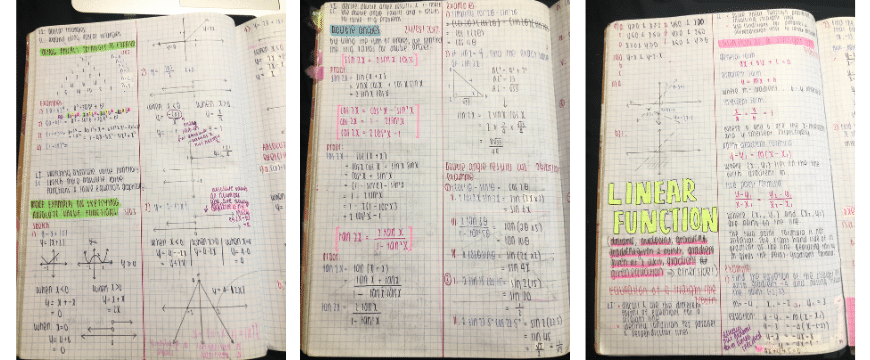
These notes are much more detailed and the important information are spread across a large chunk of pages.
You won’t be able to possibly remember everything you’ve learned 3 terms ago…
So, they are especially useful to when you want to revisit everything you’ve learned in class, including formulas, explanations, and class examples.
So, to revise your detailed notes, you should:
Now, just because you’ve revised for Maths using your detailed notes, that doesn’t mean that you’re done. Band 6 Maths students will also revise with their formula books!
But what is a formula book?
Below is an example of a Band 6 Maths student’s formula book that they’ve been writing throughout the year.
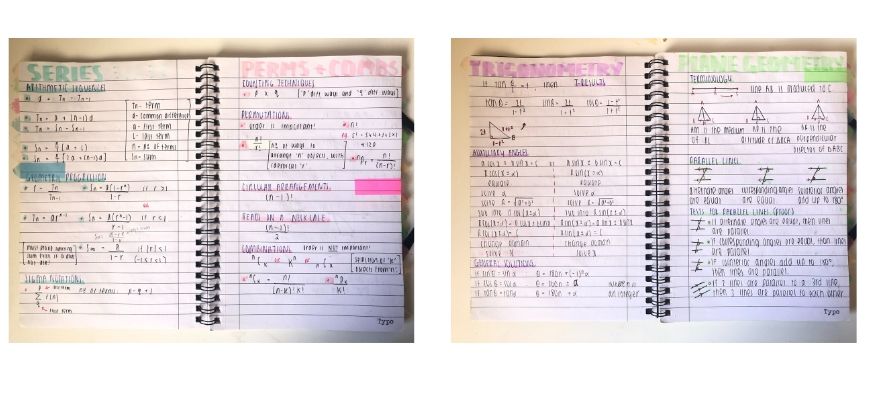
See how it is concise, simple and only contains the most important information?
They are especially useful when you want to quickly memorise your formulas or revisit any formulas you’re unsure of.
Formula books are a set of concise notes containing:
So, if you haven’t written one already, get a small notebook and a pen and write down all the important formulas and rules.
This book is especially useful when you want to revise during the days leading up to your exam because all the important information is condensed.
Top Maths students understand the importance of completing past papers, both open book and under exam conditions.
Each method has their own different advantages, so aim to complete a variety of the two.
Let’s see what the benefits are, and how you can complete your past papers this way.
Open book past papers are highly beneficial to do. Treat this as a learning opportunity to fine-tune and develop your Maths skills.
Let’s see the benefits of open-book exam practice:
So, how do we complete an open book exam?
You should aim to complete all the questions in your past papers.
Once you’ve completed a significant amount of open book past-papers, then you can start skipping easy questions and focus on the intermediate and challenging questions.
Does the sound of doing past papers under exam conditions stress you out a little? Well, this is why we need to do them!
Completing past papers under exam condition will help you deal with exam stress and develop your exam-taking skills.
Top Maths students understand the following benefits::
So, let’s see what ‘exam-conditions’ mean:
Aim to complete at least one past paper for each of your Maths subjects throughout the week.
If you are low on time, then you can break the exam up in 1 hour or 1.5 hour sessions. Remember to complete them under exam conditions!
After working through a good amount of past papers – both under exam conditions and open book – you should start to solely focus on challenging questions.
These are usually question types that you tend to answer incorrectly, or questions that tests your least confident topics.
To do this, you should:
Remember, if you need help identifying challenging questions from the textbook, just go to the solutions to find the mapping guide (for older past papers). Select the questions from your weaker topics and work on them.
If you find are still struggling with some challenging concepts, you should:
Always remember to mark your work and seek help if you need it!
Remember, your HSC journey is not supposed to be a lonely one! You have your friends who are on the same journey as you.
So, take advantage of this and work together with your friends to improve in Maths.
You can call or meet up with your friends and:
Teaching others is one of the best ways to learn. Why?
Well, when you teach people, you are testing your understanding of the concept. If you are struggling to explain a concept, then that means that you don’t have a strong enough understanding of it.
Teaching people also helps you consolidate and better memorise Maths concepts as you are expected to verbalise it.
You can extend your understanding of your content, especially when your friend asks you challenging questions.
Start HSC Maths confidently
Expert teachers, weekly quizzes, one-to-one help! Ace your next assessment with Matrix+ Online.
Written by Matrix English Team
The Matrix English Team are tutors and teachers with a passion for English and a dedication to seeing Matrix Students achieving their academic goals.© Matrix Education and www.matrix.edu.au, 2025. Unauthorised use and/or duplication of this material without express and written permission from this site’s author and/or owner is strictly prohibited. Excerpts and links may be used, provided that full and clear credit is given to Matrix Education and www.matrix.edu.au with appropriate and specific direction to the original content.